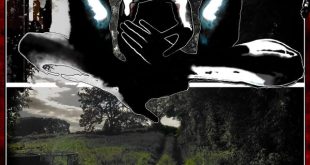If you never thought of the accordion as a radical instrument you need to listen to Pour Me A Grog – The Funana Revolt in 1990s Cabo Verde. The latest in a series of records celebrating some of the unknown and great African music from Ostinato Records, Pour Me A Grog brings listeners to the former Portuguese colony of Cape Verde – or Cabo Verde and its intrepid and brave musicians.
Funana is intrinsically tied up in the history of Cabo Verde and the slave trade that plied the Atlantic Ocean. The ten islands which make up the country off the west coast of Africa were forcibly settled by Portuguese slavers. Originally uninhabited the Portuguese claimed the islands and populated them with slaves. It is the descendants of these slaves, in particular the inhabitants of the island of Santiago, who were the creators of this unique genre of music.
In the 1950s life was difficult and young men would be forced to journey a couple thousand kilometres from Santiago to Sao Tome to work on the cocoa plantations. However, the young men also went to buy something – button accordions. It was these instruments, along with percussion that became the foundation of the Funana sound.
While the music was an expression of their African origins, (on Cabo Verde the descendants of escaped slaves called themselves Badius much like escaped slaves in the US and Jamaica called themselves Maroons) it mainly referenced their lives in their new home. With song titles like “Nha Boi” (My Bull) emphasizing the village life and the day to day importance of things like the being trusted enough to look after the bull.
Like the griots of African countries who are the repositories of village and family histories, the gaita (accordion) players of Cabo Verde became the oral historians of their communities through song. Of course, as you can hear from the tracks on this album, the music they play is also highly infectious and could lead to all sorts of ribald behaviour, like communal dances.
The latter in particular was considered somewhat dangerous by the Portuguese colonial masters who forbid large gatherings of people and imposed an 8:00pm curfew. Even playing a couple of notes outdoors on your accordion, let alone a full Funana song, could get a musician fined or arrested. All of which explains why the music was pretty much confined to Santiago and outlying islands until after the Portuguese left in the 1970s.
In fact it wasn’t until the 1990s that the music entered the main stream of island life. Young musicians began to incorporate the music into new compositions using electric bass and other amplified instruments alongside the accordion and traditional percussion. However, as the music on this recording testifies, they never left the roots of the music too far behind.
The music itself is amazing. The temptation is to compare it to Zydeco, but that could simply be because both are fronted by accordions. Funana makes Zydeco look tame and refined. Funana is wild and unchecked with improvisation being a major component of its creation. In fact many of the songs on this disc were pretty much created just before the bands recorded them.
The sense of immediacy and rawness comes through on these recordings and makes the songs all the more powerful. Each of the nine tracks included on this compilation are a wild and extravagant exercise in flamboyance not often heard in any kind of music. Sure there is some technical roughness, but that only adds to the texture of the sound.
As in all of Ostinato’s recordings Pour Me A Grog comes with a wonderful booklet that delves deep into the history of Funana. Even more important it supplies profiles of the key musicians on the recordings through interviews with them or surviving family members. Through this we not only get a glimpse into their lives, but the music which sustained them and their communities.
Pour Me A Grog – The Funana Revolt in 1990s Cabo Verde is a great collection of exciting and stirring music. Listen to it and enjoy.
 Blogcritics The critical lens on today's culture & entertainment
Blogcritics The critical lens on today's culture & entertainment




